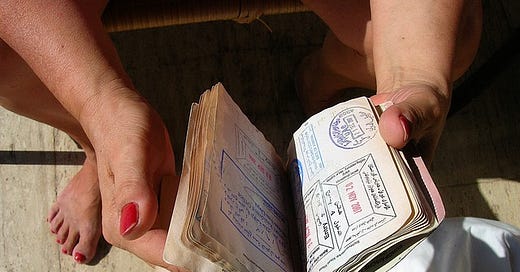I have received several emails from readers asking about changes in Portugal’s visa programs. While I am not in the “visa business” in Portugal, I will provide an overview of some of the available options.
Passive Income
Most of the folks who I speak with are utilizing the D7 “Retired or Passive Income” visa to come to Portugal. Simply put, you apply through the consulate by submitting paperwork that shows:
You can support yourself without working (through pensions, social security, rental income, investments, etc.);
You do not have a criminal record;
You have secured a place to live (as I write this you must buy a property or secure a one-year lease);
You have temporary (traveler's) medical insurance;
You have a NIF (a Portuguese tax identifier) and sufficient funds in a Portuguese bank account.
There are companies that will hold your hand through the process…but you can do it on your own1. At first, you might feel overwhelmed by the process, but relocation companies can’t do everything for you. You will have to retrieve bank statements, print investment summaries, get your fingerprints, etc. These tasks may seem tedious but they are very doable. Frankly, the most difficult part of the process seems to be securing a place to live.
Golden Visa Ending?
There has been a lot of confusion over the status of Golden Visas in Portugal. Also called “Investment Visas”, this program allowed you to make an investment in real estate or a business or cultural enterprise and secure residency while only requiring you to live in Portugal 7 days a year. Criticized by the EU, due to corruption and transparency concerns, the straw that broke the camel’s back was/is the housing crisis in Portugal.
In January 2022, the government restricted where real estate could be purchased.
In November 2022, the Prime Minister announced that the Golden Visa “had fulfil(led its purpose) and that at this moment is no longer justifiable to maintain.”
In February 2023, the Prime Minister proposed significant changes to the program. Among the more controversial proposals was that current Golden Visa applicants would be denied and that holders would be required to live in Portugal 163 days a year.
After the required “comment period” a new proposal was submitted to Parliament. It allows applicants that apply, or are approved before the law is published to continue through the process. It also permits approved applicants to maintain the 7-day residency requirement.
There is every expectation that this will be approved by Parliament and that President Marcelo will sign it into law. (No one can predict the exact date the new law will be published, so companies that offer Golden Visa services are feverishly selling their services.) Keep in mind, the changes only affect the real estate Golden Visa. Investment in businesses, the arts, and cultural programs is likely to remain. (Of the 11,000 Golden Visas issued, more than 9000 were related to real estate.)
Those that Work
There are options for those that work or plan to work. If you are looking for work, you can apply for a 120-day visa that allows you to live in Portugal and look for employment.2 The visa can be extended for 60 days, as long as the applicant can show s/he has been actively looking for employment. Like the other visas, you will have to have health insurance, a clean criminal record, and show you have adequate financial resources (approximately €3400) to support yourself during the search.
In addition, earlier this year, Portugal created a visa for Digital Nomads.
This visa is granted to people who earn four times the minimum wage in Portugal, approximately $2,750 a month, and allows the holder to live in Portugal for up to one year or alternatively to then apply for residency and to stay for longer. If you go for the residency option, then this lasts for five years and can then be renewed for a further five years – after that you can apply to be a permanent resident in Portugal or a Portuguese citizen. As a Portuguese citizen you then have the right to live, work and study in any country in the European Union, making this a very attractive option for many people looking to have freedom of movement within the Union. — ThePortugalNews.com
And More….
This is NOT an exhaustive list of the options available.3 You can find the complete list and their requirements here. Also keep in mind, if your plan is to wander around for a few years you may not need a visa. But if you are looking to relocate to a “country where the wine is cheaper than water”, is safe, has tons of culture, great weather, and welcoming people permit me to recommend Portugal.
Até logo, fica bem,
Nanc
The Facebook Group Americans & Friends in Portugal is a great source of information and provides detailed information for those wanting to relocate to Portugal.
We have an American friend who came to Portugal this way. A sommelier who previously worked in Napa Valley, he has entered into agreements with local restaurants to host wine-pairing parties. So as you can see, you don’t necessarily need to find a 9 to 5 job…you can think outside the box as long as the “employer” is willing to provide the necessary confirmation to the government.
For example, Portugal offers a “Family Reunification” visa program.







Nancy, thanks so much for your shout-out about my Wine is Cheaper Than Water story! Personally, I began reading your insightful blog last year as we readied ourselves for our move from Florida – taking in your keen perspectives on the challenges and delights of our new home and its culture.
With gratitude, Becca Williams
Really interesting and helpful. Thank you!